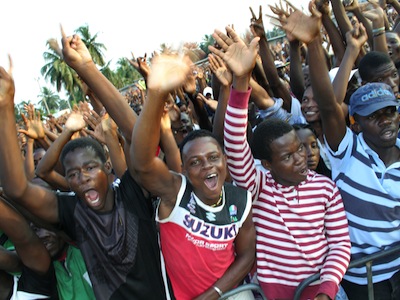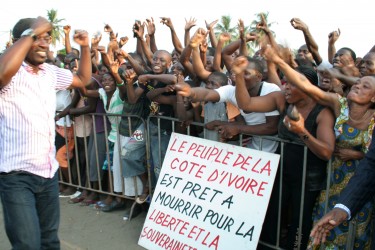This post is part of our special coverage Côte d'Ivoire Unrest 2011.
The meeting of five African Union (AU) heads of states about Côte d'Ivoire's state of electoral deadlock made it briefly possible to believe that a détente in the country's political crisis was within reach. The West African nation has been experiencing a drawn out governance stalemate since two opposing leaders, Laurent Gbagbo and Alassane Ouattara, both claimed victory in the November 2010 presidential election.
Alas, this mediation, called by many the “last resort meeting”, seems to have failed, after Laurent Gbagbo's representatives in Ethiopian capital Addis-Ababa rejected [fr] the panel's conclusions on March 17, 2011 (the day after the decisions were announced):
“Nous avons estimé que c'est une proposition inacceptable”, a déclaré le président du Front Populaire Ivoirien (FPI) Pascal Affi N'Guessan. “Malheureusement, nous avons constaté que le panel de haut-niveau s'est contenté de reprendre ce que nous savons déjà. Le panel est dans l'incapacité de nous donner les arguments qui fondent cette décision.”
Failed Mediation

Supporters of Charles Blé Goudé, leader of the Student Federation of Cote d’Ivoire who has called young Ivorians to arms at a rally in Abidjan. Image by Stefan Meissel, copyright Demotix (21/12/10).
This stance of Laurent Gbagbo came as somewhat of a surprise after his enthusiastic embrace of the 16th AU Summit's decision to set up a panel of five heads of states, in charge of finding a peaceful solution to the Ivorian post-electoral crisis. Gbagbo even welcomed it as a victory, as he had already wished for a high level international commission to come to Côte d’Ivoire to “find out about the truth about the sequence of events during the elections”, and further assess the whole electoral process.
What did the panel recommend that angered Gbagbo's camp so much?
Firstly, it reached the conclusion that Alassane Ouattara won the election and suggests he forms a national unity government; the prime minister, defence and interior ministers would all have to be appointed according to the Permanent Concertation Frame (Cadre Permanent de Concertation [fr] – CPC), of the Ouagadougou Agreements.
The panel also recommends creating a National Security Council (Conseil national de sécurité – CS) to set up a new Ivorian military, as well as institutional changes in the system of parliamentary elections and other upcoming elections.
Moreover, the establishment of a Republic High Council was suggested, the mission of which would be to promote social reconciliation in Côte d’Ivoire. To put all this into place, they required the Ivorian Constitutional Council (Conseil Constitutionnel [fr]) to proceed with Ouattara's inauguration as president, and the latter to offer former President Laurent Gbagbo guarantees.
After ratifying these propositions from the panel, the AU Council for Peace and Security asked the President of the AU Commission, Jean Ping, to appoint a high representative responsible for following the implementation of the resolutions on the ground, and ready to take any relevant and necessary steps to apply and enforce the decisions taken.
Media influence
Those measures did not go down well with Gbagbo: in Ivorian economic capital Abidjan, the following days were used by the pro-Gbagbo media to influence the nation towards a complete rejection of the AU panel's decisions. For instance, in a statement to the press the national secretary of the Women's Organization of the Front Populaire Ivoirien (OFFPI), Marie-Odette Lorougnon condemns:
l’incapacité des pays Africains «à se démarquer des injonctions de la France et des Usa » pour piétiner la Constitution ivoirienne
According to her:
la décision du panel d’entériner la victoire de M. Ouattara Alassane ne repose sur aucun fondement. «En le proclamant élu, sur la seule base de la certification de M. Choi, le panel a manqué d’objectivité et de courage…Il a montré l’incapacité des organisations africaines à prendre leurs responsabilités et le refus d’une certaine Afrique de grandir, de prendre sa liberté, son indépendance et d’acquérir sa souveraineté»
Lorougnon's statement was repeatedly broadcast by Ivorian television channel RTI TV and mentioned on the channel's Twitter account (@RTI_Officiel):
@RTI_Officiel: Déclaration de l'OFFPI relative à la décision du Panel de l'UA. – RTI 1ere -http://t.co/V3HISrG via @AddThis
After the recommendations of the last chance negotiation had been rejected, Alassane Ouattara called upon his opponent Laurent Gbagbo in a calm speech on Ivorian television on March 15, 2011:
Au président Laurent Gbagbo, je voudrais dire qu'il est temps, dans l'intérêt supérieur de la Nation, qu'il accepte de se conformer à la volonté des Ivoiriens et aux décisions de l'Union africaine.
Il doit comprendre qu'il s'agit-là, pour lui-même et pour ses proches, de la dernière chance pour une sortie pacifique et honorable. Sa responsabilité est personnellement engagée.
To President Laurent Gbagbo, I would like to say that the time has come for the better interest of the [Ivorian] nation, for him to accept to agree and comply with the will of the Ivorian people and the African Union's decisions.
He has to understand that it is now, for him and those near him, the last chance for a peaceful and dignified departure. It is his personal responsibility.
Laurent Gbagbo declined delivering a speech on television on Thursday March 17. Instead, his spokesperson offered on the same day the proposition of Ivorian talks [fr], calling on the “rebels” to lay down their arms. The Ouattara camp declined this offer, with diplomatic aide Ali Coulibaly stating:
Gbagbo essaie d'endormir la conscience des gens […] sa parole n'a aucune espèce d'importance […] Que signifie une issue pacifique ? On veut que Gbagbo parte c'est tout […] M. Gbagbo a accepté de négocier une issue pacifique de la crise, sans condition préalable

Charles Blé Goudé, leader of the Student Federation of Cote d’Ivoire (FESCI) at a meeting in Abidjan, Cote d’Ivoire. Image by Stefan Meissel, copyright Demotix (21/12/2010).
Over the last weeked, the situation in Côte d'Ivoire has taken a turn for the worst. On Saturday March 19, leader of the Student Federation of Côte d'Ivoire (FESCI), Charles Blé Goudé, called on the pro-Gbagbo youth movement Jeunes patriotes (Young Patriots) to enrol in the national Ivorian army (loyal to Gbagbo) this Monday, 21 March, by registering at the Armed Forces headquarters in Abidjan [fr].
During his speech [fr] Blé Goudé, nicknamed the “Minister of the Streets” rallied his troops:
Je demande à tous les jeunes de Côte d'Ivoire [fr] qui se sentent aptes, qui sont prêts à mourir pour leur patrie, qui ne supportent plus l'humiliation que subit la Côte d'Ivoire, de se rendre dès lundi à 07H00 (locales et GMT) à l'état-major pour se faire enrôler dans l'armée afin de libérer la Côte d'Ivoire de ces bandits
End to “bare hands struggle”
This call for war signals the end of the “bare hands struggle” that Blé Goudé has long been calling for against the “forces of occupation” [fr], namely the United Nations peacekeepers and the Force Licorne, a French regiment based in Côte d'Ivoire:
J'ai fait le choix de la résistance aux mains nues, je suis en train de me rendre compte qu'on veut m'obliger à changer de ligne. On veut m'obliger à faire ce que je n'ai pas envie de faire
This call from Blé Goudé contrasts sharply with the “dialogue” suggested by Gbagbo and deeply concerns many Ivorians, such as Twitter user @Marie0531, who tweeted on March 20:
@Marie0531: #Gbagbo‘s conflicting messages:Willing to hold talk with rival and then belies supporters to neutralize the opposition.#CIV2010 Pick one
For many Ivorians and observers, Blé Goudé's statement is a big step forward on the path toward civil war in Côte d'Ivoire. @nicocerise tweeted on the same day:
@nicocerise: Blé Goudé prévoit d'envoyer à la mort des jeunes patriotes. lundi est une journée fatidique pour la #civ2010 l'heure est gravissime
A call to arms made by a civilian in the absence of military leadership meanwhile, raises questions for @woizo_sp:
@woizo_SP: Lappel au 2e enrolement se fait sans la présence de MANGOU lors du meeting de BLE GOUDE et mieu se fera a la GR.La vérité va sortir #civ2010
Is the worst yet to come? Will Côte d'Ivoire be the stage for a civil war? To recruit and arm young volunteers is a terrifying move and a sinister reminder of the Interahamwe Hutu paramilitary organization during the 1994 Rwandan genocide.
Even if the bloodshed does not reach the magnitude of the Rwandan tragedy, widescale attacks on civilians are to be feared.
This post is part of our special coverage Côte d'Ivoire Unrest 2011.







1 comment